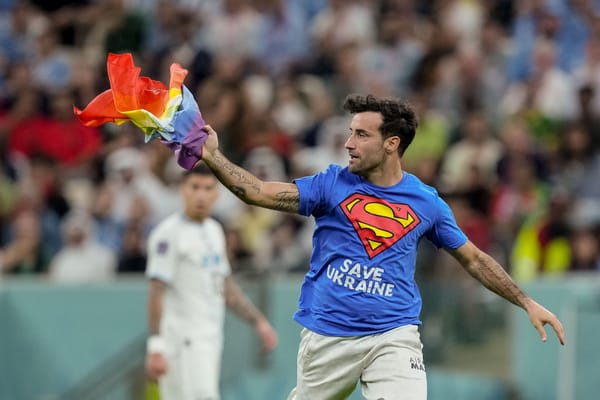The 2022 World Cup comes to a close this Sunday with a final showdown between France and Argentina. Throughout the contest, activists, NGOs, and Western leaders have criticized host nation Qatar’s appalling rights record and exploitation of migrant labor, but despite these objections, it has gone off largely without a hitch.
Perhaps the most politically representative moment of the competition occurred during the Nov. 28 match between Portugal and Uruguay. Around 50 minutes in, a protester wearing a Superman T-shirt with “Save Ukraine” emblazoned on the front and “Respect for Iranian Women” on the back charged onto the pitch, waving a rainbow flag—evidently trying to call attention to Qatar’s mistreatment of gay people while tacking on a few other causes du jour for good measure. If this action achieved anything, it was to lay bare the impotence of liberal protest today, reduced to a jumble of incoherent signifiers that obscure the functioning of global capitalism.
Qatari money and influence percolated into the heart of Western economies well before the Persian Gulf nation’s leaders set their sights on hosting the World Cup. Britain imports nearly 10 percent of its oil from Qatar. American supermajor ConocoPhillips, meanwhile, owns part of the Qatari North Field, which has received investment from France this year, and promises to help Germany replace sanctioned Russian gas.
There is nothing all that exceptional in Qatar’s alleged bribery of FIFA officials or virtual enslavement of the migrant workers who built the infrastructure for the tournament. These practices are part and parcel of the cozy economic relations between Western corporations and countries that flagrantly violate the human-rights principles the West claims to cherish. The World Cup has merely shined a spotlight on the normal operations of an economic system defined by tax, regulatory, and labor arbitrage: The same system that encourages Western corporations to outsource jobs to circumvent local taxes and labor standards back home also facilitates the importation of slave workers into Qatar.
The protesters who have objected to this year’s World Cup perversely serve to obscure these realities. They do this by foregrounding favored victim groups and presenting their plight as the responsibility of designated individual villains, like the leaders of Qatar and Russia. This fashionable advocacy, by distorting the structures in which these humanitarian crises take place, ensures their perpetuation. For instance, if expanding Qatari gas extraction allows Europe to break its dependency on Russian fuel, “Saving Ukraine” may well mean increasing the exploitation of migrants working in abysmal conditions on Qatari oil fields.
The tacit premise that all would be well if the World Cup were hosted in a more humane nation neglects the economic integration of these states with those in the West that posture as human-rights advocates. Moving the event to a less oppressive setting is roughly equivalent to taking our gas from North Field rather than Gazprom (the Russian energy company that proudly sponsored the Champions League until earlier this year).
In the faux moral drama surrounding this year’s World Cup, victim groups are played off against villainous oppressors as well as against each other—as when some who objected to Qatar’s treatment of women and gay people were met with accusations of cultural imperialism. Such controversies resemble nothing so much as elite international sport competition itself, which likewise serves to mystify the material system in favor of individual identities jostling for recognition.
To protest against the World Cup in Qatar on behalf of particular victim groups is to buy into the logic of the event itself, a space of competing identities in which the inequality produced by the global economic system finds symbolic recompense in the triumph of a few select heroes. The trophy operates as a reward for those who make it to the top, and thereby incentivizes others to attempt to do the same. This is how value is created. The system needs the hours of input to generate surplus value. It also needs to mystify this operation by putting individuals and identities on a pedestal, thereby inducing others to enter the game, promising competition—economic, athletic, or symbolic—that will lift them to the top.
“Policing the enjoyment of consumer spectacles will get us nowhere.”
Policing the enjoyment of consumer spectacles will get us nowhere. As the philosopher Jacques Rancière wrote, the critical starting point for emancipatory politics is the “conflict over the existence of a common stage and over the existence and status of those present on it.” In other words, we have to know which sites of protest are capable of counting for something. Losing our ability to distinguish what matters—to pick our battles—was, for Rancière, at the core of our political impasse.
The protests against the Qatar World Cup are thus largely misdirection, only serving, like the contest they are supposedly pitted against, to legitimate and reproduce the system as a whole.
